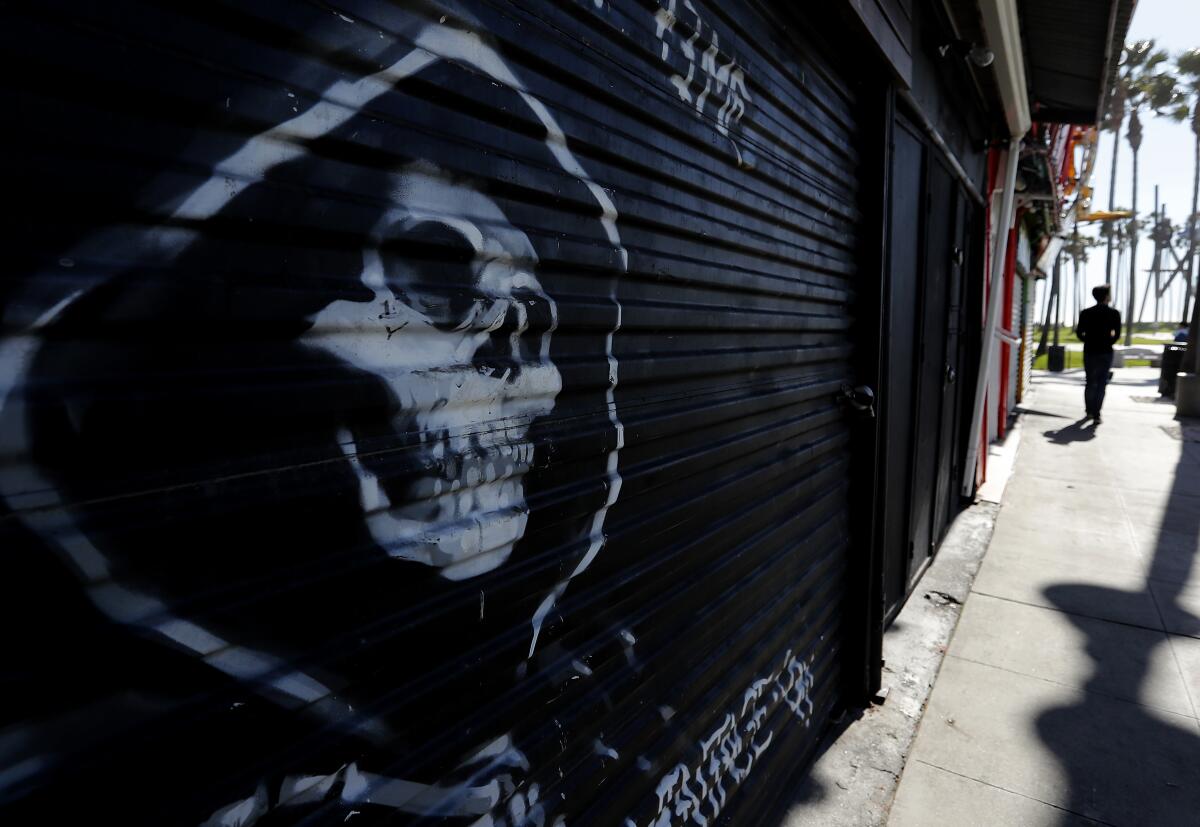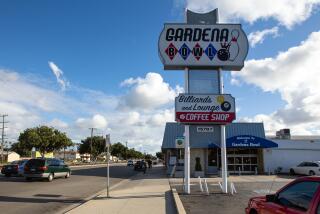âItâs a stake in the backâ: âNonessentialâ businesses close after stay-home orders

For more than 100 years, California Floral Co. has stood sentinel in downtown Los Angeles.
The florist predates the founding of Warner Bros, UCLA and the first concerts at the Hollywood Bowl. It made it through World War II and closed for only a day or two during the 1992 L.A. riots. But the novel coronavirus could bring California Floral to its knees.
A day after Los Angeles Mayor Eric Garcetti told all nonessential businesses in the city to close to slow the spread of the novel coronavirus, owner Johnny Huynh was at the flower shop to shut down the coolers and clean out. He gave away his remaining flowers to some of the neighboring shops â eateries Mikeâs Deli and Azay.
âItâs just a stake in the back,â he said. âThe final stake. I can hold for about a month or two, but not more than that.â
Los Angelesâ dramatic announcement ordering business closures until at least April 19 and urging people to stay at home, bolstered by sweeping orders Thursday night from the state as well as Los Angeles and other counties, was greeted by business operators Friday with resignation and sadness.
The orders are broad but have significant exemptions that are creating some confusion about which types of businesses can keep their doors open. Nurseries, for instance, are allowed to operate but florists arenât.
The actions also are raising questions of inequities between some large retailers that are allowed to sell certain merchandise that smaller retailers, such as gift and clothing boutiques, canât sell, except online.
The directives followed announcements Wednesday and Thursday by three of the countryâs largest shopping center chains that their malls would be closed or mostly closed until March 29 â or longer if required by state or local governments.
Mall closures were announced by Unibail-Rodamco-Westfield, which operates 15 malls in California including Westfield Topanga & the Village in Canoga Park, Westfield Santa Anita in Arcadia and Westfield Century City.
âWe have not made this decision lightly, and believe this is in the best interest of protecting our various stakeholders,â said Jean-Marie Tritant, U.S. president of the Paris-based company. âWe look forward to reopening these centers in the very near future. In the meantime, we are doing everything possible to make sure that âessentialâ retail outlets remain accessible.â
Also closed were Simon Property Group malls such as Del Amo Fashion Center in Torrance and Ontario Mills in Ontario. Taubman Centers Inc. closed malls across the country including the Beverly Center in Los Angeles and the Gardens on El Paso in Palm Desert.
Smaller, stand-alone businesses were busy Friday considering their options and wondering whether they would be able to survive in the coming weeks or months.
In Eagle Rock, Leanna Lin was figuring out how to turn her predominantly brick-and-mortar retail business into an ecommerce-only operation. She has run Leanna Linâs Wonderland, âa playful gift shop and art gallery for the young at heart,â since 2010.
Less than a week ago she had decided to offer curbside pickups to her customers. Now, going entirely online eliminates the beading and art parties â birthday and otherwise â hosted in the store.
âAs long as this doesnât go much further than April 19, I think we can make it,â Lin said.
On her Instagram page, which has 13,800 followers, Lin is showcasing items, offering free shipping on purchases of $25 or more and asking customers to buy gift cards.
âPlease support us online,â one recent post implored. âI promise you itâs just as cute and weâre adding a bunch new things often.â
One prominent store operator forced to close his Los Angeles shops said he was incensed that big retailers deemed essential such as Costco, Walmart and Target now have the market to themselves to sell nonessential items such as toys, towels and holiday knickknacks that people might otherwise buy at small businesses.
âThis really bothers me,â said Fraser Ross, owner of two Kitson stores on Robertson Boulevard, who fears, for example, being stuck with surplus Easter stock after he resumes business. His competitors shouldnât get to sell theirs right now either, he said.
âIs that Easter section at Costco getting closed off?â Ross asked rhetorically. âThey shouldnât be able to ring anything unless itâs essential.â
Matt Monroe sat inside Turn Zero Games on Friday with the lights off as he waited for a UPS truck to deliver off a shipment to the store heâs owned for seven years.
The 38-year-old and his five-member staff had already taken precautions, such as limiting the number of people coming into the Koreatown shop.
On any given night before the pandemic, the store would host 20 to 50 people to play card tournaments and shop for new items. With the sudden lack of foot traffic and a website devoted mainly to in-store pickups, Monroe has sent emails to his landlord and distributors asking if he could defer payments for the next 30 days.
âWe just all have to be smart and take it one day at a time and try not to panic or do anything rash,â he said. âWeâre doing all we can right now, but we really canât do a ton.â
Creative digital marketing agency Social House has been offering free consulting sessions to businesses suddenly forced to become social media experts. Chief Executive Norel Mancuso said the Los Angeles firm has fielded calls from 35 businesses, including restaurant groups, hair salons and shoe stores.
One of the ideas her company came up with was for a sunglasses brand: hourlong online DJ sessions for customers.
âIn a time like this itâs important to offer customers a form of entertainment, a form of escape, some fun,â Mancuso said.
Knowrealitypie in Los Angeles has shut down its pie shop but is letting customers preorder pies for curbside pickup. Owner Tracy Ann also is pushing her âpie clubâ through her website and social media, which lets customers buy multiple pies at a discount for a future date.
âSo we have 60 personal pies that people have orderedâ for weekend pickup, Ann said.
âWe are masked and gloved and when people come to our shop they will text or call and we will walk the pies out. They are not to get out of the car,â she said. âSo, thatâs how we are handling it. We are going to see how that goes.â
Times staff writers Emmanuel Morgan and Roger Vincent contributed to this story.
More to Read
Inside the business of entertainment
The Wide Shot brings you news, analysis and insights on everything from streaming wars to production â and what it all means for the future.
You may occasionally receive promotional content from the Los Angeles Times.












